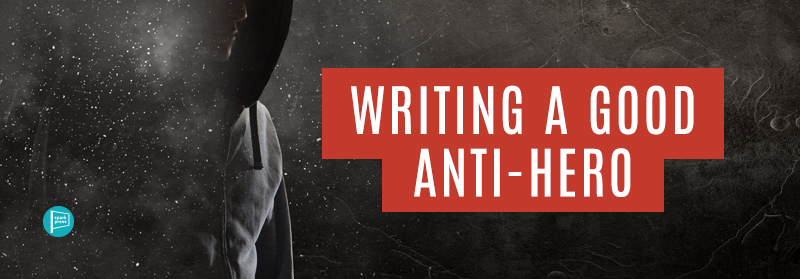
What is an Anti-Hero?
An anti-hero is a central character, usually a protagonist, who lacks conventional heroic qualities. They are deeply conflicted, quite cynical, and their internal struggles make their moral compass a little misguided. They are the protagonists that have a “dark side”, make questionable choices, but are ultimately guided by good intentions.
In fact, their complexity is what makes them likeable. Despite not making the greatest decisions, anti-heroes are typically very realistic and relatable. Readers love the characters with a fragile self-esteem on the verge of an identity crisis because it makes the character more real. They are able to associate them with your average human being.
So, how do you write these paradoxical beings?
Writing an Anti-Hero
Types of Anti-Heroes
A good place to start is knowing the different kinds of Anti-Heroes that exist. There are typically three different types of Anti-Heroes that you can write about. The first is your pragmatic rebel, the realist who associates with both the good guys and the bad guys. They do whatever is deemed necessary in order to accomplish their mission. Think of the infamous Batman or Catwoman; they are for the most part good and don’t cross the blurry line unless it’s for the greater good. These are the anti-heroes that tend to follow the hero’s journey.
The second is an immoral or unscrupulous anti-hero. This is the average anti-hero that you tend to see in stories. They fall into the grey area of good intentions, but with selfish motivations. They have a very distorted view of the world, and their actions are dictated by their past traumas and inner conflict. Loki Laufeyson from the Marvel comics fits into this mold as he doesn’t care how he achieves his goal, even if it requires him to go—and enjoy—the dark side. Holden Caulfield, from The Catcher in the Rye by J.D. Salinger, is living in a world that unfortunately is very real and absurd and therefore guides his decisions through the novel.
The last type is the heroic villain type. Dexter, from Darkly Dreaming Dexter by Jeff Lindsay, which you might also know as the hit T.V series Dexter, borders on being a villain. As a sociopathic serial killer, his actions are questionable. The element that sets him apart is that he justifies his behavior by “benefiting” society. He’s working with the good guys by killing the bad guys and making the world a better place.
Villains vs. Anti-Hero
When writing your anti-hero character, make sure to know the difference between them and the villain because they are two very different characters. Anti-Heroes tend to have a line that they won’t cross and work for the greater good, at least for the most part. Villains have no boundaries and have clear, harmful intentions. The villains also stand in the way of the protagonist, they want to block them from achieving their goals. While the anti-hero is usually the protagonist, and even if they are some sort of secondary character, they either stand to the side and do their own thing or help out, on their own terms of course. Anti-heroes are not villains, they are the antithesis to the competent hero figure.
Please Give Them Purpose
Every character should serve a purpose in your story, and the anti-hero is no different. The purpose of the anti-hero is to show human nature at its finest. If there is any character that imitates real people and thinking, it’s this character type. In reality, humans are flawed and everyone at some point struggles with making the “right” choice, so write your character accordingly. Anti-heroes prove that this is a common element to living, they represent the ethical reasoning of society that is often conflicting. Jay Gatsby, from Fitzgerald’s The Great Gatsby, represents the “American dream”. Yet, he does it through unprincipled means.
Also remember, they might be paradoxical and complex, but they still require a character arc. So, make sure to give them a reason for their actions and the decisions they make. The reason they act the way they do is important to the story. Robin Hood exemplifies this by stealing from and cheating the convoluted rich, but he is giving it back to the people. They have underlying pathos, their behavior is more than often justified in some sense. Try not to write them as role models, let them act in the ways that we wish we could in some situations. They aren’t just rebels who can’t follow the rules, they are complicated beings who act with conviction.
Anti-Heroes are obnoxiously charming. They have motives that range from honor to revenge to wanting love and acceptance, and they coincidentally have a soft spot for the underdogs. They are the loners, the outsiders, the estranged people of their worlds. Write these characters with sympathy, and apathy. You as the author have the world in your hands, literally. These are the characters that you can use to tug at the reader to think. So, write an anti-hero the reader feels for, falls for, and maybe even fights against morally … just to make it fun.

Leave A Comment